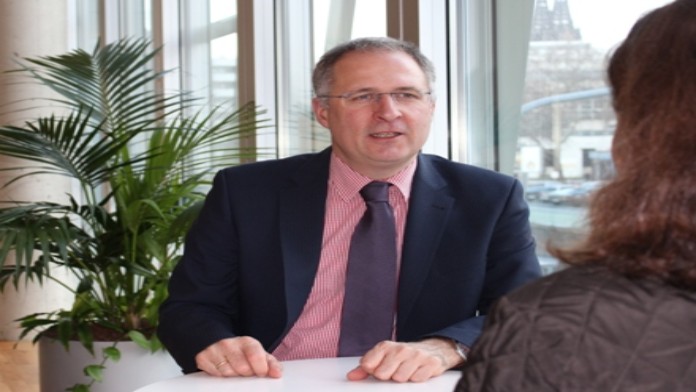News from 2014-01-13 / DEG, Sustainability
Spotlight on the head of DEG's Sustainability Department
Martin Geiger
How does DEG work in practice, which criteria have to be fulfilled by the co-financed companies and how does DEG contribute to triggering positive developments in the partner countries – those are topics which will now be approached by experts in our new section “Spotlight on”. The section is launched with Martin Geiger, head of DEG's Sustainability Department.

Mr Geiger, what are the core tasks of your department?
Our tasks are based on DEG's development policy:
In a systematic review, we assess the environmental and social impacts associated with a possible DEG investment in a company. At the same time we develop solutions to avoid, reduce or compensate any negative impacts. We thus complement DEG's risk management. By doing so, we ensure that DEG only finances companies that already fulfil international standards to a large extent or that have declared their willingness to reach these in the near future.
Furthermore we assist companies co-financed by DEG in making their business activities more sustainable, e.g. through measures aiming at improved energy efficiency, wastewater treatment or biodiversity conservation. Additionally we help create a better understanding of the needs of employees, local population and other stakeholders and take these specific needs into account, exceeding statutory requirements.
As a general rule, which companies can receive finance from DEG?
In line with our mandate, companies must operate in a developing country as a condition for a DEG financing. We do not only finance German companies, but in particular companies operating locally and regionally.
How does your team look like and what are the most important qualifications?
Our team consists of ten employees who, on the one hand, are familiar with a broad range of environmental issues but who also contribute extensive knowledge of social aspects. Our experience covers a wide range of sectors, ranging from agribusiness to the chemicals and steel industry, infrastructure, renewable energies and to environmental and social risk management in the financial sector. In the social domain, the main focus is on labour law, occupational safety as well as cooperation and communication with parties directly or indirectly affected by our investments.
If a company is co-financed by DEG: which environmental and social aspects are contractually agreed upon?
All financed companies must undertake to comply with the national environmental and social regulations. In case of investments with a potential medium to high environmental and social risk (applies to around 80 per cent of all investments), the IFC Performance Standards are additionally included. These standards are currently considered as the accepted international benchmark and take full account of the UN Guiding Principles on Business and Human Rights, adopted in 2011. The Performance Standards are accompanied by requirements that define sector specific minimum standards and guidelines. Furthermore, they ensure compliance with the core labour standards of the International Labour Organisation related to, among other things, freedom of assembly, child or forced labour and discrimination.
Linked to this topic are also certifications in the environmental field, such as FSC for wood products or ISO 14001 for environmental management, or in the social field (OHSAS 8000). These certifications help companies improve their environmental and social management while increasing their competitiveness.
And what is more, DEG - as a general rule - does not undertake investments in particularly critical sectors. These cases are summarised in an exclusion list.
How does DEG's environmental and social review look like in practice?
All DEG investments undergo an environmental and social screening process. In case of investments with medium to high risks, our department performs a comprehensive on-site due diligence in order to determine whether standards are complied with and if there are any deviations. This on-site due diligence is in large part supported by external experts. Any deviations are recorded in a contractually agreed environmental and social action plan. The companies are obliged to remedy shortcomings in accordance with a fixed time schedule and to provide a report on the progress on a regular basis. To this end, an external independent monitoring is often agreed upon in case of complex and large investment projects, supplemented by regular on-site visits by our team.
What is your experience with regard to DEG's requirements: are they rather seen as a hindrance or a help?
Looking back over the past years, it can be said that a better understanding of the need for compliance with certain standards has developed. Furthermore, legislation on this issue has improved in many countries.
In our view, it is generally easier to agree on requirements and to implement these if companies are already familiar with international environmental and social standards and if they therefore are able to make a realistic estimate of the efforts and benefits involved. On the other hand, there are companies that have only indirect experience with international standards, e.g. via its customers or suppliers. In these cases, a great deal of convincing is certainly needed. Companies that so far have operated only locally and in countries with weak legislation and administrative controls are more likely to question the meaning of this additional effort. But also within this group there are companies that consider these additional efforts as a chance to outperform competitors.
Many companies have confirmed to me that thanks to their cooperation with DEG and our advisory services they were able to develop further, thereby paying more attention to environmental and social aspects in future.
Martin Geiger has been head of DEG's Sustainability Department since June 2012. Prior to joining DEG, he had worked at WWF for many years.
Further information

Share page
To share the content of this page with your network, click on one of the icons below.
Note on data protection: When you share content, your personal data is transferred to the selected network.
Data protection
Alternatively, you can also copy the short link: https://www.deginvest.de/s/endBZF67.sqA
Copy link Link copied